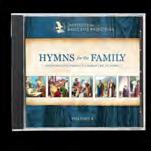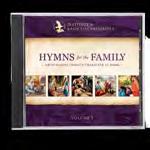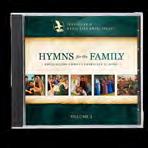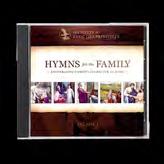Tolerance
Acceptance of others as unique expressions of specific character qualities in varying degrees of maturity

PHILIPPIANS 2:2
ANANIAS SEES SAUL THROUGH GOD’S EYES

“And Ananias went his way, and entered into the house; and putting his hands on him said, Brother Saul, the Lord, even Jesus, that appeared unto thee in the way as thou camest, hath sent me, that thou mightest receive thy sight, and be filled with the Holy Ghost.”
ACTS 9:17

BIBLICAL CHARACTER ILLUSTRATED CURRICULUM Illustrated in Scripture, Illustrated in Life SPIRITUAL GIFT: Giver
“Fulfil ye my joy, that ye be likeminded, having the same love, being of one accord, of one mind.”
CONTENTS
2 Introduction
2 How to Use This Curriculum
3 Goals and Objectives

4 Character Quality Overview
5 Tolerance in Scripture
6 Lesson 1: View People as He Does
7 Bible Story: Ananias Sees Saul through God’s Eyes
8 Memory Verse: I Corinthians 12:23
9 Activity: Learning to See Potential
10 Lesson 2: Respond with Grace
11 Bible Story: The Disciples Send the Children Away
12 Memory Verse: Philippians 2:2
13 Activity: Word Search
14 Lesson 3: Help Others Grow in Character
15 Bible Story: A Letter of Exhortation to Philemon
16 Memory Verse: II Timothy 2:24
17 Activity: Bugged or Watered?
18 Lesson 4: Not Confuse
What Is Right with What Is Popular
19 Bible Story: Idolatry Overcomes a House and a Tribe
20 Memory Verse: I Thessalonians 2:4
21 Activity: Do I Join the Crowd?
22 Additional Resources
22 Tolerance GEMs
23 Journal and GEM Mine
24 Hymn Sheet Music: “Just As I Am”





25 Hymn History: “Just As I Am” by Charlotte Elliott

26 Explaining Salvation to a Child
27 Reproducible Coloring Pages
31 Recommended Resources

Biblical Character Illustrated Curriculum
Illustrated in Scripture
“The testimony of the Lord is sure, making wise the simple” (Psalm 19:7b). Biblical character is illustrated in this curriculum through both artwork and lessons from the lives of people in God’s Word. We most often benefit from the positive examples of faithful men and women. “For whatsoever things were written aforetime were written for our learning, that we through patience and comfort of the scriptures might have hope” (Romans 15:4). There were also people in the Bible who are representations of poor character, and we can learn from their lives as well. “Now these things were our examples, to the intent we should not lust after evil things, as they also lusted” (I Corinthians 10:6). We would be wise to learn from the testimonies God has given us in Scripture.
Illustrated in Life
“Faith cometh by hearing, and hearing by the word of God” (Romans 10:17). Hearing the Word of God causes us to grow in faith. This curriculum offers many practical applications of God’s Word to everyday life. “But be ye doers of the word, and not hearers only” (James 1:22). As God enables us to act in faith, our lives as believers will illustrate His character to others.
The character of God
is illustrated in Scripture. May it also be illustrated in our lives.
Character Quality Overview


What Is Tolerance?
Read aloud and discuss what tolerance means and how it applies to life.
The operational definition of tolerance is “acceptance of others as unique expressions of specific character qualities in varying degrees of maturity.” Tolerance is extending grace to those who lack wisdom or maturity, realizing everyone is at different stages of personal growth. Sometimes you may be irritated by someone’s childishness, mistakes, or lack of experience. How can a person overcome his irritation? A believer can ask God to show him how God sees people. (See Romans 5:8.) When believers value people, they are able to understand, forbear, or be patient with others. God can help a believer to recognize that he also has faults, mannerisms, or characteristics that require grace from others. Understanding his own faults can give him insight to accept others where they are in their lives. God gives grace to the humble! As one walks in the Spirit, he will manifest the fruit of the Spirit, which includes love and longsuffering. (See Galatians 5:22–25.)
The opposite of tolerance is prejudice. A prejudiced person has a false sense of superiority and judges others from that position. He categorizes people and dislikes certain ones for superficial reasons. He disdains those who are different from himself. Even before he knows a person well, he makes assumptions and forms opinions. Viewing others with a critical eye, he mocks or excludes
those whom he dislikes. Prejudging people is just one aspect of intolerance. An intolerant person lacks the humility and maturity to appreciate and respect others. He considers character flaws to be unchanging traits that define the offender, and he assumes there is no hope for improvement. Thus, the intolerant person has no reason to give others opportunity or time to change. He simply ignores or avoids those who make him uncomfortable. His uncaring actions are hurtful, and his preconceived ideas cut off relationships that might have benefited himself and others.
In recent years, tolerance has been redefined to mean “showing acceptance of all ideas and beliefs, whether they are right or wrong.” This viewpoint implies that all ideas and beliefs are equal. However, every idea or belief must be measured by the truth of God’s Word, the Bible. A religious, political, or cultural belief may be a contradiction or a misinterpretation of God’s Word. “Beware lest any man spoil you through philosophy and vain deceit, after the tradition of men, after the rudiments of the world, and not after Christ” (Colossians 2:8). Even though you cannot agree with all ideas, display tolerance by treating all people with respect. Be courteous even when you disagree.
People with prejudiced opinions have no patience for those who do not “measure up” to their expectations. Their intolerance can reject or hurt others, overlooking their potential.


4
An oyster responds to an invasive grain of sand with nacre to form a precious pearl. Likewise, we can respond with humilty and tolerance, allowing God to form His priceless character in us.
Tolerance in Scripture

As you read and study God’s Word, you will see Who He is! Be willing to be changed by Him so Christ can be seen through your life and others will glorify God.
The Character of God
We see examples of tolerance in God’s character in the following ways:
• God knows how needy we are and is kindhearted toward us.
(See Psalm 103:8, 14.)
• God offers salvation without partiality and welcomes believers into His family.
(See Romans 3:22, Ephesians 1:5–6.)
• God often delays judgment as He patiently waits for men to repent.
(See Jonah 3:9–10, II Peter 3:7–9.)
• Jesus disregarded others’ prejudice when He spoke to the Samaritan woman, even though others would condemn Him for doing so.
(See John 4:9–10.)
• Jesus was willing to associate with sinners so that He could minister to them.
(See Luke 15:1–2, 10.)
• Jesus did not condemn the adulterous woman or ignore her sin but told her to do what was right.
(See John 8:3–11.)
• The Holy Spirit works in believers and, over time, patiently changes them to be like Jesus.
(See II Corinthians 3:18.)
TOLERANCE KEY VERSE
“Fulfil ye my joy, that ye be likeminded, having the same love, being of one accord, of one mind.” PHILIPPIANS 2:2
Tolerance in My Life
Now let’s examine some ways God wants us to live out tolerance daily.
• Why should I be tolerant of others?
(See Matthew 18:32–33.)
• Is it Biblical to hate the sin and love the sinner?
(See Jude 1:22–24, Romans 12:9–10.)
• Do I focus on the shortcomings of others and try to change them, or do I examine myself before God?
(See Romans 14:10–12, Luke 6:42.)

• Rather than despise a weaker brother, how does God instruct me to respond?
(See Romans 14:1–7.)
• Should my treatment of others be based on their outward appearance?
(See James 2:1–4.)
• What attitudes does God tell me to have toward my fellow Christians?
(See Romans 12:16, I Peter 4:8.)
• Should I let what is popular influence my thoughts and behavior?
(See Exodus 23:2.)
5
View People as He Does

Haveyou ever looked through a microscope? This instrument enables you to see things that are invisible to the unaided eye. Under a microscope lens, a whole new world is visible! Similarly, God has a perspective that we don’t have. He sees much more about a person than we can. You may see only people’s facial expressions, attire, mannerisms, or personalities. You may not like or understand someone’s behavior or choices, yet God sees a person created in His image and of great worth. He sees beyond who we are now to who we can become in Christ. Because God is patient, merciful, and forgiving, He tells believers to treat others in the same way. “Wherefore receive ye one another, as Christ also received us to the glory of God” (Romans 15:7).
Acceptance of others as unique expressions of specific character qualities in varying degrees of maturity



6
TOLERANCE
INTRODUCTION GOD ENABLES ME TO
Ananias Sees Saul through God’s Eyes
BIBLE STORY
Ananias Sees Saul through God’s Eyes
Saul studied for many years, learning philosophy from the Greeks and law from Jewish Pharisees. His goal was to serve God and punish those who appeared to be disobeying the Law of God. As the Christian martyr Stephen was stoned to death for his faith in Christ, Saul watched approvingly. Zealous to extinguish the early Church, Saul invaded Christian homes and threw believers into prison. When Saul heard that the Gospel had spread to the city of Damascus, he sought approval from the high priest to arrest Christians there. After securing the desired papers, Saul embarked on the 130-mile journey. As he neared Damascus, a bright light from Heaven shone
1. What did God direct Ananias to do?
(See Acts 9:10–12.)
How would God want you to welcome someone who is unpleasant to be around?
2. What did Ananias know about Saul? Why did Ananias appeal to God? (See Acts 9:13–14.)
Why might you dislike someone you haven’t even met? Have you asked God to help you get to know him?
3. How did God view Saul? Did He focus on Saul’s past as a persecutor or on who he could become in Christ? (See Acts 9:15–16.)
What makes every person valuable in God’s eyes?
(See Genesis 1:26–28.) How does God view Christians? (See Colossians 1:21–22.)

4. What did Ananias do that showed he trusted God, Who sees perfectly? (See Acts 9:17.)
How will your words and actions change when God gives you the wisdom to see as He does?
(See James 3:17–18.)
on the determined persecutor! He fell to the ground, stunned. Saul trembled as he heard Jesus speak to him, and he asked, “Lord, what will you have me to do?” When Saul opened his eyes, he saw nothing! Blind and humbled, he had to be led into the city, where he lodged for three days, neither eating nor drinking. How would God direct a Christian named Ananias to minister to Saul? What fears would Ananias have? Would he be willing to see Saul as God did, or would he view the persecutor only in light of the man’s terrible treatment of Christians?
Let’s read the Bible story in Acts 9:10–22 and then discuss the following questions.
5. What was the result of Ananias’s visit to Saul? (See Acts 9:18.)
How might a younger sibling, a church member, or an unsaved person benefit when you reach out to him?
6. Who accepted Saul into their company after his salvation? (See Acts 9:19.)

Why is it important to avoid cliques and welcome others into your circles of friendship? (See John 13:34–35, James 2:8–9.)
7. How do we know that Saul’s conversion was genuine? What was the Jews’ response to Saul? (See Acts 9:20, 23.)
How has God changed your life since you were saved? How have you seen Him change others? (See II Corinthians 5:17.)
8. What impact did Ananias’s ministry to Saul have on the Church? (Acts 9:21–22, 31.)
What might happen if you humbly ask God to show you the value of those whom you might otherwise overlook?
7
LESSON 1 View People as He Does
Revealing the character of Christ through the stories in His Word.
SAVE 20% on any individual Biblical Character Illustrated booklets

Use coupon: BCICBOOKLET


Biblical Character Illustrated Curriculum
Discover this unique tool that uses the stories in Scripture to illuminate character qualities God wants to develop in the lives of His people. This curriculum contains multiple ways to teach character to kids and give them a vision for building character through faith in Christ!

Single Booklets: $10 each
Complete Set: $379 (SAVE 23%)
OTHER BIBLICAL CHARACTER RESOURCES

Single PDF Download: $3 each
PDF Download Set: $109 (SAVE 25%)

Biblical Character Illustrated 49-Booklet Set
Includes 2 bonus items: Calendar + Understanding Spiritual Gifts

Power for True Success
Insightful, Biblical studies on all 49 character qualities
Hymns for the Family, Volumes 1–4




Companion hymns for each character quality
Character Sketches, 4-Volume Set
Timeless resources to show God’s character relfected in creation

Shop these resources at store.iblp.org. • Questions? Call 903-636-9600 or email biblicalcharacter@iblp.org.



























